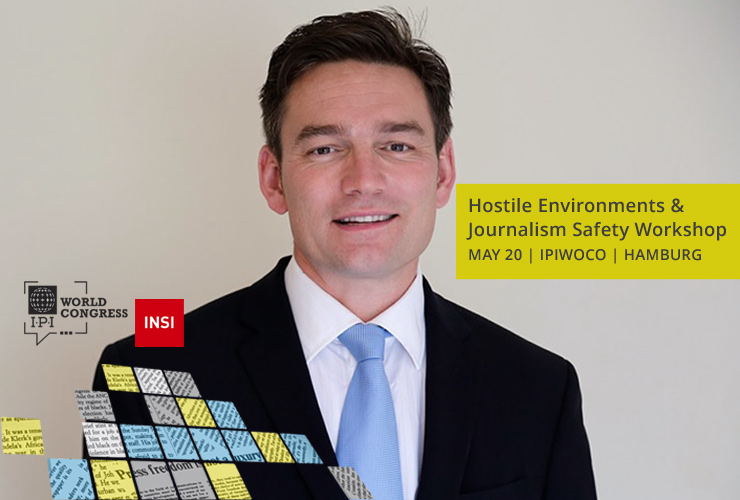Practicing journalism is often tied to a range of threats: from online harassment to criminal prosecution and physical attacks, informing the public comes at a high price. Journalists and media workers operating in hostile environments – such as those marked by armed conflict or natural disaster – are particularly vulnerable.
According to the International Press Institute’s (IPI) Death Watch, in 2016 at least 83 journalists were killed in connection with their profession. Twenty-five lost their lives in Iraq and Syria alone. While hostile environments pose extreme risks for journalists and civilians alike, journalists, in attempting to do their job and get close to the story, are particularly susceptible to danger. However, there are certain measures journalists can take to improve their safety.
At the 2016 World Congress in Doha, IPI presented the International Declaration on the Protection of Journalists. The Declaration, issued jointly by IPI, the Al Jazeera Center for Public Liberties and Human Rights, the African Media Initiative and the International News Safety Institute (INSI), reiterates the responsibility of states to guarantee journalists’ safety but also highlights best practices for media organisations, encouraging news organisations and journalists to take steps for greater safety.
IPI spoke to Joel Whittaker, a security consultant at INSI, who will lead a workshop on the safety of journalists in hostile environments at IPI’s 2017 World Congress in Hamburg this May. INSI, a London based organisation dedicated to journalists’ safety, provides free-of-charge trainings to journalists all over the world.
IPI: You served in the British Army for several years. How did you end up training journalists and how has your military background benefited your approach to this issue?
Whittaker: I served in a very active military unit and we constantly trained for and deployed on operations globally. I saw firsthand the benefits of training; how it saved lives, increased productivity and made us more effective.
Working with the media, mostly in conflict zones, was actually a natural fit when I left the military. The level of awareness that is gained serving on military operations is tough but not impossible to impart in training, it requires immersive and interactive learning designed to keep participants engaged. I really enjoy teaching journalists, their raison d’être is to question and so they are very involved if the training is pitched right.
IPI: Has the security situation for journalists reporting from hostile environments and the risks they face changed over the last years?
Whittaker: Journalists no longer have immunity whilst on assignment. In fact, they are a commodity to many. Governments, militias and criminals all actively target the media for their own aims. Security awareness among journalists is higher now than in the past.
IPI: You tailor trainings depending on audiences and the risks they face. How do you ensure cultural sensibility in your trainings, especially for foreign correspondents?
Whittaker: Firsthand knowledge. I regularly work in the field with the world’s media, typically hard news but also documentary film makers. This year I have been embedded with Iraq special forces as our media team followed the advance into Western Mosul and covered the Reina shooting in Istanbul. All this exposure allows me a better understanding of cultural differences which are, of course, hugely important.
IPI: INSI trains journalists and media workers from all over the world. Are there (relatively) simple measures or tools that journalists are often not aware of but that have a big impact in practice?
Whittaker: Planning and – within reason – sticking to the plan. It’s a simple concept but often ignored to the detriment and death of many journalists.
IPI: Female journalists often face different threats than their male counterparts. How do threats and training for woman journalists differ?
Whittaker: Sexual violence is something many women face. There are some basic steps to reduce this threat. I don’t see this as separate to training the guys. Men should be aware that sexual violence can affect them too and also be made aware of what to look out for to protect their female colleagues.
IPI: People usually have conflict zones in mind when they think about ‘hostile environments’. What about less obviously dangerous situations, such as elections?
Whittaker: I will cover the Turkish referendum in April, which is likely to involve large-scale protests. Threats from the crowd could be theft or assault, sexual assault in Cairo was used as a weapon. Hand-thrown missiles like bricks and tiles are common, sometimes petrol bombs.
Being associated or targeted within the crowd by authorities could be an issue too. Certainly I expect CS gas and water cannon but live ammunition could also be a factor.
IPI: What are your key recommendations for journalists covering demonstrations and other big events?
At a minimum, journalists should wear clothes that cover and don’t melt. Keep to the peripherals, stay together and always have an eye on your exit options, they can quickly change. Personal Protective Equipment (PPE) should incorporate a lightweight helmet, respirator, eye wash and water.
Joel Whittaker’s workshop on “Hostile Environments & Journalism Safety”, as part of IPI’s 2017 World Congress from May 18 to 20 in Hamburg, Germany will take place on Saturday, May 20 at 2 p.m. For more information on the IPI World Congress and to register please visit: https://ipiwoco2017.sched.com/
No additional fee. Admission to the workshop is included in the World Congress registration fee.



